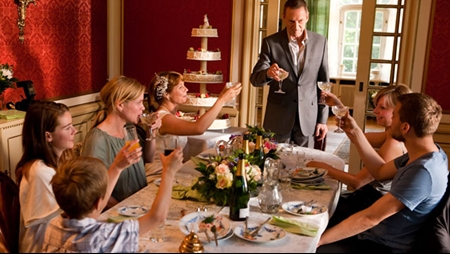A Family (Pernille Fischer Christensen, 2010): Denmark
Reviewed by Byron Potau. Viewed at Regal Cinemas in Los Angeles as part of the 2010 Los Angeles Film Festival.

In this exploration of family amidst a dying patriarch and questionable future of the family business A Family suffers from resolving its conflicts too early, not fully exploring others, and droning on far too long to remain engaging to its audience.
Daddy’s girl, Ditte (Lene Maria Christensen), accepts a job offer at a New York art gallery and makes plans to move there with her boyfriend. When she finds she is pregnant they quickly decide to abort rather than blow their opportunity to live in New York. However, when her father, Rikark (Jesper Christensen), finds out he has a brain tumor she has to decide if she should stay to care for her father which ultimately means passing on New York and her new job opportunity. To complicate matters her father expects her to take over the family’s prestigious bakery business.
With its compact and complex opening montage director Pernille Fischer Christensen fascinatingly spans four generations of the Rheinwald family in just a couple of minutes, from the great grandfather walking from Germany to Denmark with a sack of grain to the development of the Rheinwald bakery to the present day Rheinwald children. There is a wealth of information and the old newsreel/home movie footage is a particularly smart touch in informing the audience of the Rheinwald family’s back story. However, the remainder of the film cannot live up to its brilliant opening and it becomes increasingly less engaging the longer it goes on.
The abortion storyline seems resolved very quickly though with a disturbing scene, but the subject keeps popping back up just when you had forgotten about it, but it never seems to fit comfortably with the rest of the film and subsequent references to it should have ended up on the cutting room floor.
The conflict over Ditte taking or not taking over the bakery is one of the film’s main conflicts yet it is resolved long before the film’s ending which makes the rest of the film drone on as you wait impatiently for it to end.
One conflict that is introduced, but never appropriately dealt with is that of the disagreement between the father’s new wife, Sanne (Anne Louise Hassing), and Ditte and her sister. Rikard wants to return home from the hospital rather than go to a hospice to be cared for, but Sanne takes a firm stance, stating her position as his new wife and part owner of the house, and insisting to his daughters that he must go to a hospice because she cannot take care of him. One would expect this storyline to develop, however, the next scene has Rikard returning home and Sanne happy to receive him as if the disagreement had never happened.
The performances are all very good, and the film certainly feels realistic, but it is the kind of realism that is not very engaging. Films cut out life’s boring parts for a reason, but this film, specifically the second half, seems composed of many of life’s mundane scenes, especially since they are not really working toward anything because the film’s main conflicts have already been resolved. It makes for a realistic, well acted, but ultimately uninteresting film that struggles to keep its audience’s attention. The film would have succeeded better by ending about twenty minutes earlier than it did. As it stands, the latter part of the film might find your eyes looking anywhere but the screen to find something to keep your interest.
About this entry
You’re currently reading “A Family (Pernille Fischer Christensen, 2010): Denmark,” an entry on Student Film Reviews
- Published:
- 06.20.10 / 10pm
- Category:
- Films, Los Angeles Film Festival 2010
1 Comment
Jump to comment form | comments rss [?] | trackback uri [?]